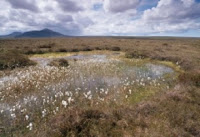The Programme's website describes its purpose:
The IUCN UK Peatland Program was established in 2009 to promote peatland restoration in the UK. A three-year programme of work has been developed to provide a "conservation quartet" consisting of partnerships, strong science, sound policy and effective practice. An overarching theme for this work is the promotion of the multiple benefits of peatlands to society.
The programme will:
- Provide a focus for the wide range of expertise and work in peat and research and management to provide credible, relevant and consistent messages for decision-makers
- facilitate consensus building and knowledge exchange in the UK, with links to international work
- highlight the benefits and values of peatland ecosystem services to help encourage sound policy and funding for peatlands
- demonstrate and promote best practice in peatland management
(IUCN is the International Union for Conservation of Nature and it helps the world to find pragmatic solutions to our most pressing environment and development challenges)


